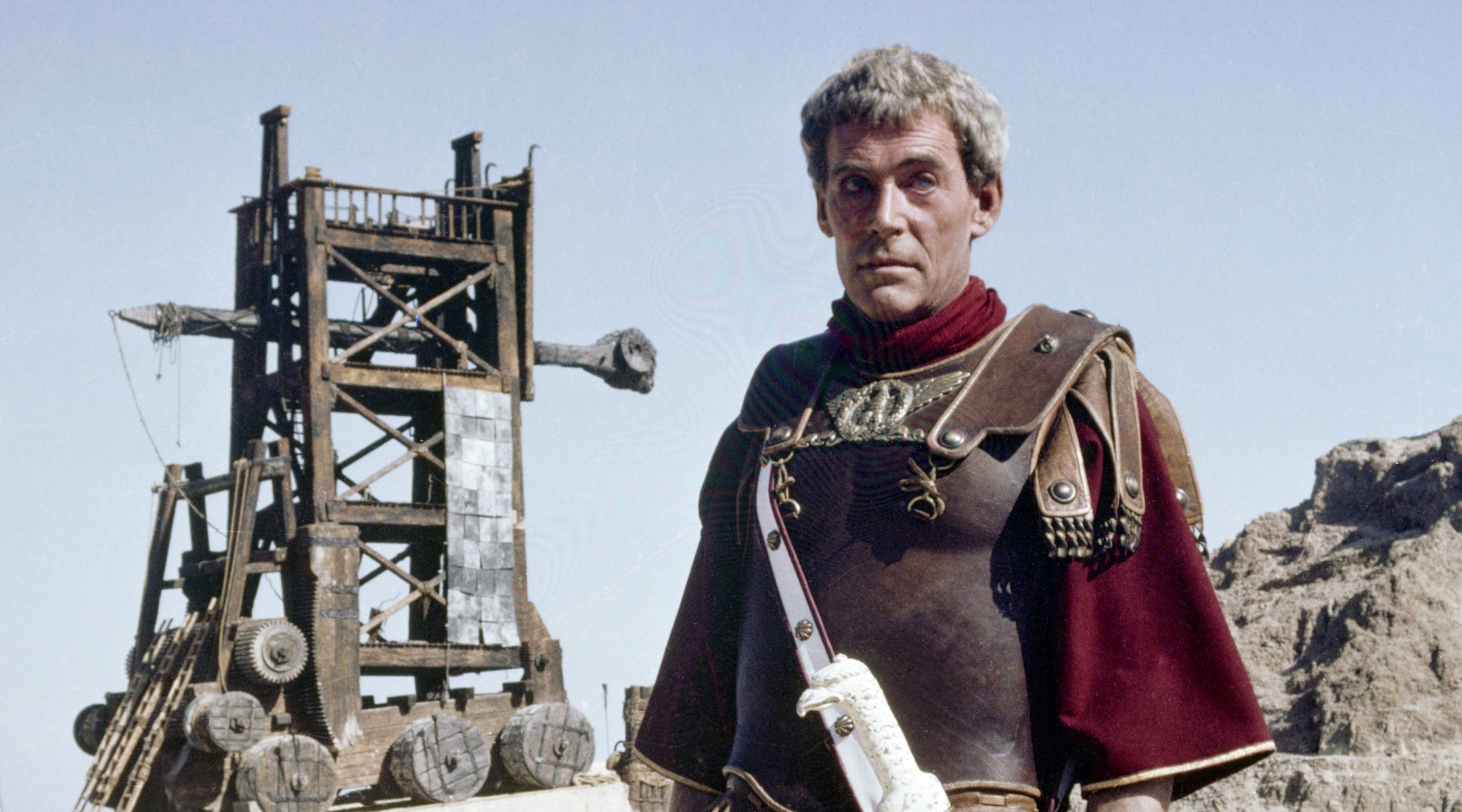The eight-hour ABC-TV series, “Masada,” depicting the heroic battle of a handful of Jews against the Roman empire, but which in a broader sense depicts man’s fight for freedom, is clearly a hit among viewers across the country.
The epic, which began airing Sunday night and will conclude tonight, caught the imagination of the American public and triggered an uplifting mood in the week after the attempted assassination of President Reagan, thereby reiterating to our generation that the indomitable spirit of man will triumph in 1981 as it did 1900 years ago in the Judean hills.
The first episode of Masada on Sunday drew a national rating of 27.1 and a 40 percent share of the audience, or some 75 million viewers, according to early readings. In New York City, the first episode drew 45 percent of the audience. The numbers differed slightly in other cities for Sunday’s, Monday’s and Tuesday’s episodes. It is too early to determine how the entire epic will fare compared to “Roots,” which achieved a 45 rating and a 66 share overall, and “Shogun,” which got a 32.6 rating and a 51 share.
The series, which cost close to $22 million, was shot on location in the blistering heat of the Judean desert. It features 105 speaking roles, took five-and-a-half months to shoot, and required a crew of almost 300 people.
ISRAELITES REGARDED AS ULTIMATE VICTIMS
Peter O’Toole, who portrays the Roman General Cornelius Flavius Silva who led the Tenth Legion in the four-year assault against the mountain fortress of Masada, told this columnist in an interview earlier this year that he regarded the Israelites as the ultimate victors in the struggle for Masada. He also said he is aware of the code of honor of the Roman warrior of antiquity who was expected to sacrifice his life to avoid the humiliation of defeat. The Romans understood the gesture of defiance at Masada.
“That stretch of land that the ancient rulers called Syria has soaked up more blood than any part of the world,” O’Toole sighed.
“But it has done more extraordinary things and altered the paths that civilization and society have chosen more than anywhere else on earth. It is the part of the world where the recorded mind of man began. “Asked how the public would react to the Masada film, O’Toole said, “I think, it will be overwhelmed by the notion of liberty.”
Peter Strauss, the New York actor who rose to fame on TV, and portraying the part of the defiant Eleazar ben Yair in the Masada series, wanted to play the role as a simple human being, not as a demagogue or a leader who has mystical powers over his people. “There are those who have an inbred charisma who create their power through military support or other device. And power is wielded in many different ways. The Judean leader of old, not a specifically religious man, wielded it through commitment,” Strauss said.
David Opatoshu, who is the white-bearded Shimon, was no newcomer to filming in Israel. I met him in 1961 in Bersheeba (doubling on the screen for Addis Ababa) portraying an Italian army doctor in Dino DeLaurentiis’ “The Best of Enemies,” a World War II epic with an Ethiopian background in which he co-starred with David Niven and Alberto Sordi. Borbara Correra come from Hollywood to portray the Egyptian Jew, Sheva. Though she depicts a warm-hearted woman with compassion for her people, this reviewer did not like her to be referred to as a whore. Neither did this reviewer appreciate the repeated mentioning of prostitutes among the Hebrew captives who sell themselves to the Romans, nor the willingness of the slaves to contribute, though under the whip, to the doom of their brethren. All this is humanly understandable, but can be misjudged by an audience comfortably seated at the television set.
The performances of a large cast, with the British-Irish contingent portraying the Romans, and Americans as well as Hebrew actors in the roles of the Israelites, are convincing. Notable are Giulia Pagano as Miriam, Anthony Quayle as Gallus, Timothy West as Emperor Vespasian, David Warner as Falco, Joseph Wiseman as Jerahmeel, and, especially, Clive Francis as Attius, the youthful aidde-camp to Silva. Reuben Bar Yotam renders a gem of characterization as the butcher atop of Masada.
A WORK OF GREAT SOLEMNITY
Director Boris Sagal, supported by the cinematography of Paul Lohmann and Jerry Goldsmith’s theme music, spreads out before us the biblical landscape of 19 centuries ago in a richly woven tapestry of events. It is a work of great solemnity in which both sides are treated with dignity and respect.
Arnon Milchan, the Israeli industrialist who headquarters in Tel Aviv as well as in Paris and London, is credited as supervising producer in Israel and his company listed as co-producer with Universal Pictures. This columnist talked with Milchan who was in Hollywood recently for the first “American Film Market in Hollywood.” It was he who inspired the making of Masada and supplied the original financing.
Only 36 years old, Milchan is a tenth generation Sabra and, though out of the country for the greater part of the year, one of the strongest supporters of the Israeli cinema. He recently announced the production of the huge costume picture, “The Pirate,” to be directed for him in Israel by Roman Polanski.
JTA has documented Jewish history in real-time for over a century. Keep our journalism strong by joining us in supporting independent, award-winning reporting.
The Archive of the Jewish Telegraphic Agency includes articles published from 1923 to 2008. Archive stories reflect the journalistic standards and practices of the time they were published.




